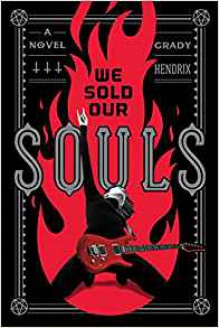






by Grady Hendrix
Kris Pulaski was a rock star who almost made it, but now she lives paycheck to paycheck at a boring (if she's lucky) job as a cheap hotel desk clerk. All she has is memories of what almost was and the band member who ripped everybody off and went on to stardom, then obscurity, until she sees a billboard advertising his return tour.
This was a wild ride that earns its Horror category well and truly. Heavy on rock and roll, mainly Heavy Metal, but also you'll encounter conspiracy theories, supernatural stuff, cults, social commentary and a whole list of triggers with claustrophobia topping the list and some notable gore. If you've got a trigger, just assume it's in here somewhere.
I should mention that the characters were all distinctive and well developed, especially Kris, and the plot had unpredictable twists and all sorts of surprises.
Some parts of this were difficult for me to read, but I had to know what would happen so I persevered. The end was worth it. For the Horror fan, this is a work of art. For those who don't like Horror or tend to be squeamish, best steer clear. I can see this story developing its own cult following. Black Iron Mountain has touched the souls of all who read it.


I’m a little late to this one so I’ll only add my one cent instead of my usual two. You’re welcome, lol. Also, everyone else has already said all the things and said them better than I ever could at this point.
So I'll start off with my complaint because, sorry for those who don’t know, I’m kind of a jerk. This book about proper southern housewives and the possible pasty-ass vampire in their midst is set in the ’90s and I continually felt as if I were reading a book set in the ’70s. It might be because the whole housewife under the thumb of her man is rather foreign to me and it feels outdated in the ’90s but I could probably chalk this up to different life experiences. Anyhow, I pretended it was set in the late ’70s and it was easier to swallow the fact that these ladies were feeling so beholden to their menfolk. And, argggghhh, these men. They are all so TERRIBLE. Terrible, horrible, evil, selfish creatures who were rude and condescending and infuriating whenever they were on the page. I’m not even talking about the vampiric one either. He’s even worse but at least he has a bit of an excuse. He IS a monster. He is expected to behave like a monster (and damn does he ever!) The rest of these dudes are simply vile humans and I’m so glad all men weren’t like this in the ’90s and that’s all I have to say about that.
Whew, sorry about that. The rest of the book is fantastic. It’s full of dark humor and takes its time with the horror. The opening chapters set the scene and bring the characters and their daily struggles to life but when the horror happens hold on tight because things get creepy, disturbing, and gross. These ladies are smart and when no one will listen to them (see above) after children start disappearing and other horrible things happen, they have to take matters into their own hands and things get gloriously grisly.
“Let me tell you something there’s nothing nice about Southern Ladies.”
I’d like to see a sequel where the husbands are taken care of properly in the end. And when I say taken care of properly, I mean served up on a platter instead of being waited on by their ladies. Sorry, but I can only speaketh the truth.

by Donald Grady Shomette
Subtitled War on the New Jersey Coast 1775-1783.
Non-fiction
From the introduction: "The story of Jersey and the many thousands of prison ship martyrs who expired within her dark, pestilential bowels, was once an iconic piece of American history: it is little remembered today. So, too, was the often swashbuckling trade that the majority of her unfortunate inmates had practiced, namely privateering - that is, governmentally sanctioned commerce raiding for profit by private ships of war - during the many long years of the American revolution."
This is a historical book about legalized piracy. It's a part of history that isn't usually taught in schools, how supply lines to the American coast were interfered with by government sanctioned privateering and the horrendous conditions of prison ships that held those privateers who were captured, most notably the Jersey.
The book tells the history of how the fledgling American government debated and eventually deployed privateers because their need for naval protection along the Atlantic coast was essential, but they did not have the finances to build sufficient warships. Concern over the possibility of privateering turning to piracy did arise in discussions, but in the end necessity demanded and the inevitable infractions led to a culture of piracy that has formed famous legends over the years.
This book reads like a history book in school with a lot of facts and relation of detailed events, so is recommended for the serious history buff rather than casual reading. A lot of research obviously went into it and I found it interesting to say the least. Anyone interested in American history will find a lot of revelations in this book.